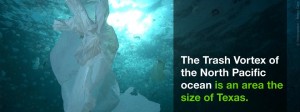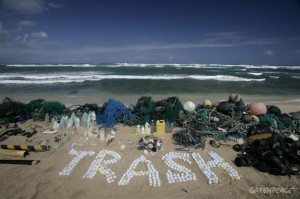
California may become the first state to ban giving away plastic bags at the check out register. Many cities have already banned free plastic bags, in 2007 San Francisco became the first U.S. city to require supermarkets and large drug stores to offer customers bags made only of recyclable paper, plastic that can be turned into compost, or sturdy cloth or plastic that can be reused. If other bans are an indicator of the possible results, a lot of plastic bags could be eliminated for good. In Washington DC when a similar ban took place and people had to pay five cents per bag, plastic bag use went from 22 million a month to 3 million …a big decrease but 3 million plastic bags a month in one city is still a lot of plastic bags when they really are unnecessary. “Californians use 19 billion such bags a year, or 552 per person, according to an Assembly analysis,” so let’s hope that the ban is passed and the public responds as they did in DC.
These numbers are mind boggling to me. I always bring my own shopping bags (and I have a big collection of them) and save the produce bags and the bags that I use for buying bulk food and reuse them again and again, although I am thinking that a dozen cloth or mesh bags that I can reuse are a better alternative. I lived in Europe for quite a few years and at the check out stand you pay for a bag, bring your own, juggle what you buy in your arms or put everything in your cart and then pack it up in your car in some sort of container that you keep in the car. It has taken us so long to catch on to this in America.
There are a lot of reasons to ban plastic bags. They are a big problem since producing them uses petroleum, creates toxic industrial waste water and air pollution. Then to get rid of them if they are burned toxins in the bag are released in the atmosphere, if they go in a landfill they don’t break down and much of the plastic waste that winds up in the oceans are plastic bags that go on to kill birds and fish, and destroy fragile ocean ecosystems. So the damage comes from start to finish, and recycling them is really expensive.
It is finally time that we look at the real costs of our modern life as we have gotten used to it and make some intelligent changes. I find it ridiculous that California Assemblyman Ted Gaines, R-Granite Bay, in opposing the ban said “This is not the time to be putting a financial burden on families in a very tough economy,” who estimated his family would spend $50 a year on paper bags. I guess he has not heard of reusable bags- he could probably spend less than $10 dollars and have plenty of bags for his family to use for at least one year.
Care about the oceans? Another important reason for plastic bags to be banned is the Great Pacific Garbage Patch, also known as the Pacific Trash Vortex. There are an unknown number of miles, some estimates are twice the size of the Continental US, in the Pacific Ocean that are loaded with debris from plastics. According to the UN Environment Programme, plastic debris causes the deaths of more than a million seabirds every year, as well as more than 100,000 marine mammals. Syringes, cigarette lighters and toothbrushes have been found inside the stomachs of dead seabirds, which mistake them for food.
Plastic is believed to constitute 90 per cent of all rubbish floating in the oceans. The UN Environment Programme estimated in 2006 that every square mile of ocean contains 46,000 pieces of floating plastic, These pollutants act as chemical sponges attracting man-made chemicals such as hydrocarbons and the pesticide DDT. They then enter the food chain. “What goes into the ocean goes into these animals and onto your dinner plate. It’s that simple.” What we allow to get into the ocean eventually comes back to all of us.
Of the more than 200 billion pounds of plastic the world produces each year, about 10 percent ends up in the ocean. And 10 percent is 20 billion pounds!
This is a great video by Christine Giordano called Bag It. In just a few minutes her video covers a lot of the reasons that plastic bags should be banned once and for all.
BAG IT from christine giordano on Vimeo.
Hopefully the Gulf oil disaster will be a wake up call to many that we need to look at all of the areas where we can cut back our demand for petroleum so that such risky oil platforms will be banned. Our demand for oil is not just about gasoline for our cars, or even airplanes, so when we take a closer look at petroleum use we see that it is all around us in so many products from plastics to fertilizers. Yes, it is used to make fertilizer that gets into food. In fact industrial agriculture is so oil dependent that many forecast that as oil costs go up our food supplies could be threatened. So remember producing and buying organically grown food is truly sustainable agriculture since it uses much less oil, adds to our food security and it’s healthier for us and the environment. This is an amazing article that looks at fossil fuels in our food when grown on industrial farms. Supporting local farmers markets also helps since locally grown doesn’t have to travel as far to get to you.
There are many areas that we can begin to reduce our consumption of petroleum based products and changing our shopping demands are crucial to send a message to businesses. See where you can make some changes and feel better knowing that you are helping to reduce our demand for oil.
And remember BYOB-bring your own bag!

[…] can read more about the effects on the ocean from plastic here. So let’s all do what we can to let California legislators know that we support this ban to […]